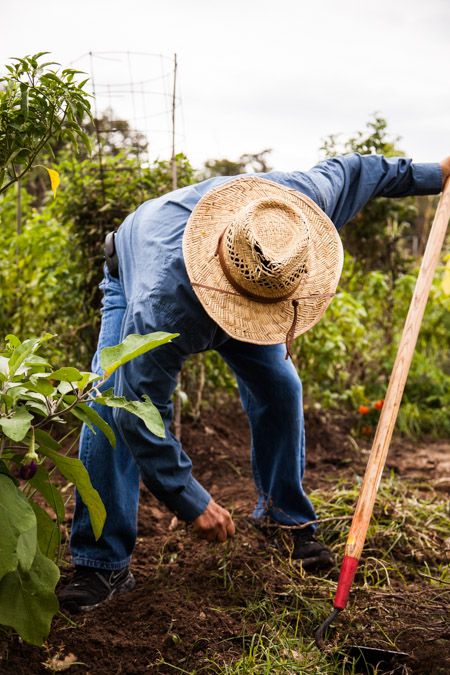Are you staring at the weeds in your garden, feeling pinched for time? Does the maintenance of the garden feel like yet another chore to add to your routine? It’s time to view garden care through a new lens and embrace one of its biggest benefits: healthy exercise! Gardening can be a part of your weekly exercise routine, bringing you many of the same benefits you might be seeking out elsewhere. If you already have a garden, you know that you may be sweaty and sore after a thorough weeding session. Shoveling soil and compost, raking, pulling out Bermuda grass, digging, and bending over to remove pests by hand are challenging workouts for even the fittest of athletes. In fact, some of our SFC volunteers who have helped in our herb garden are avid runners and shared that they include gardening as part of their training routine to provide a good workout for their backs, which became stronger from bending over frequently in the garden.
Studies have shown that gardening actually qualifies as moderate to high-intensity physical activity. That’s right! In one study, college-aged students completed the following tasks while wearing a device to track heart rate, calorie burn, and oxygen consumption: digging, raking, weeding, mulching, hoeing, sowing, harvesting, watering, mixing growing medium, and planting transplants. Researchers found that all of the tasks were considered moderate- to high-intensity physical activity, with digging being the highest-intensity job, followed by raking. The American Heart Association recommends moderate and vigorous exercise in segments of thirty minutes a day OR two or three segments of 10-15 minutes per day. Gardening could be one of those shorter segments that you schedule on the calendar – 15 minutes in the morning and 15 minutes in the evening. And, while the physical benefits are indisputable, let’s not forget the added mental health benefits that gardening provides – reduced stress (lower Cortisol levels), alleviation of depression, reduced risk of dementia, improved memory and problem solving, and increased feelings of well-being and high self-esteem. Let’s not forget that spending time in nature can be a much-needed respite from four walls or congested traffic!
If you have a garden, whether in your own backyard, a school, or community garden, consider it your personal gym, where you can reap the benefits of heart-pumping exercise that simultaneously knock out a “chore.” Don’t forget to drink plenty of water and wear sunscreen! If you don’t have access to a garden, volunteer in the SFC Teaching Garden – we could always use the extra help with weekly tasks! Contact Paula Arciniega, SFC Volunteer Coordinator, for more info at Paula@sustainablefoodcenter.org.

